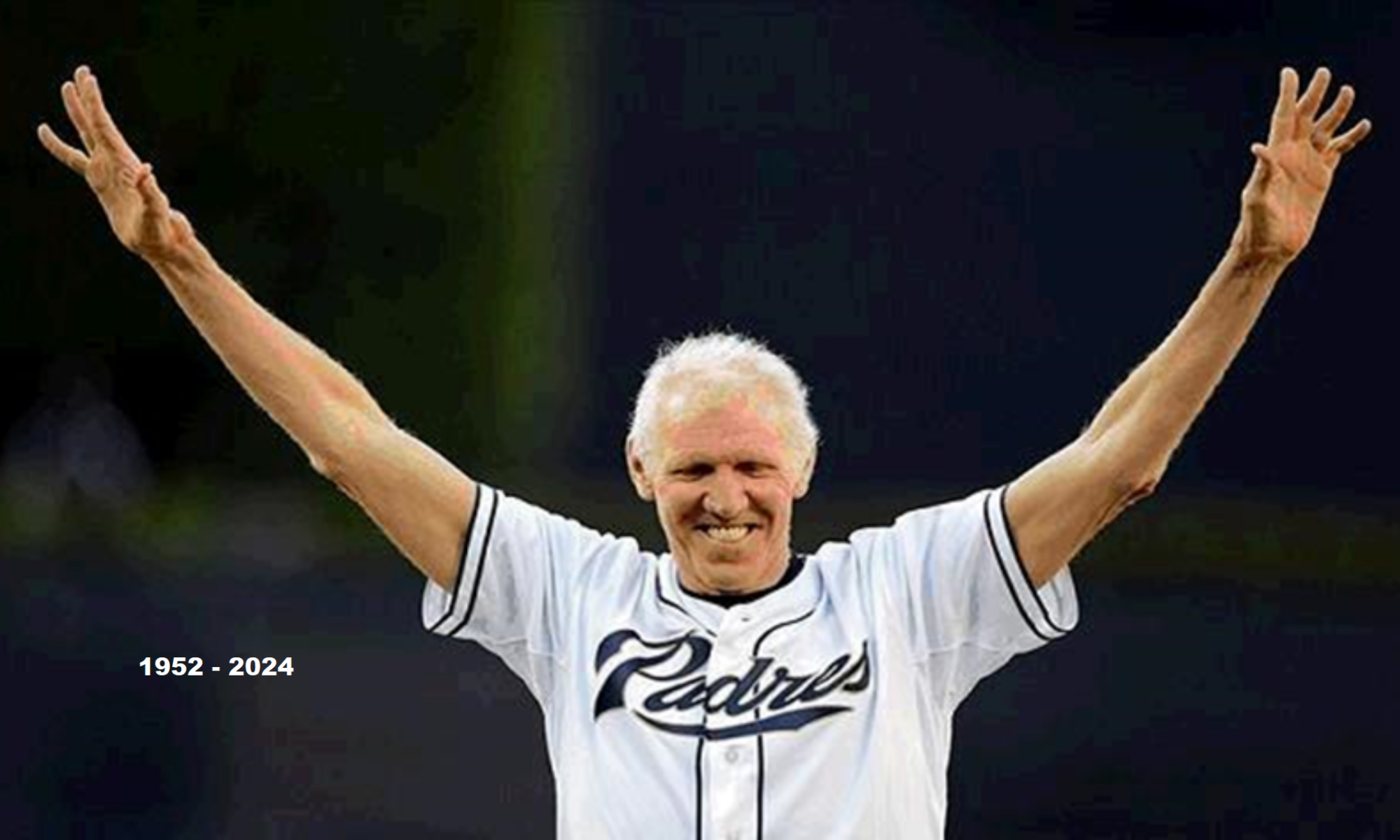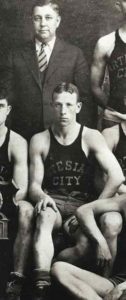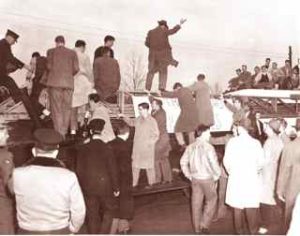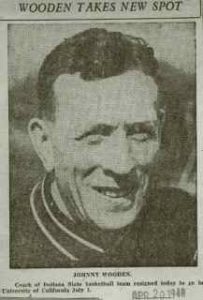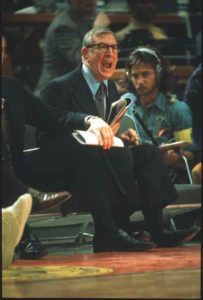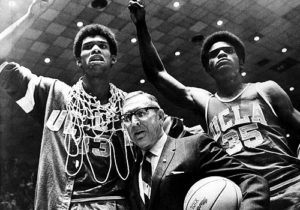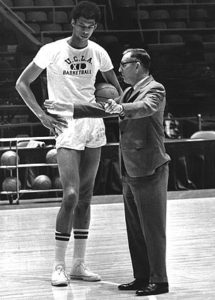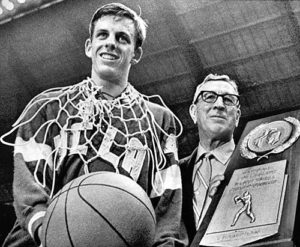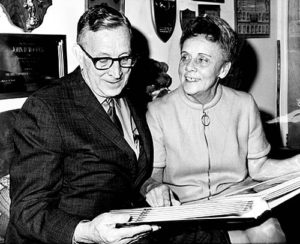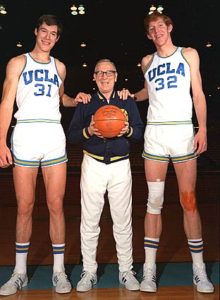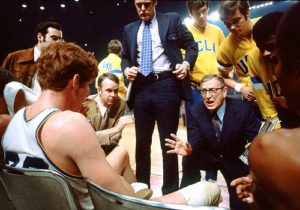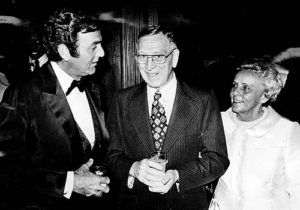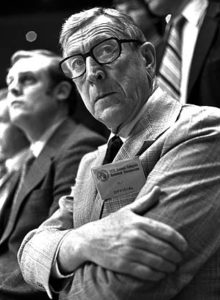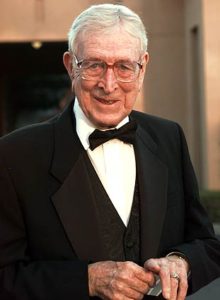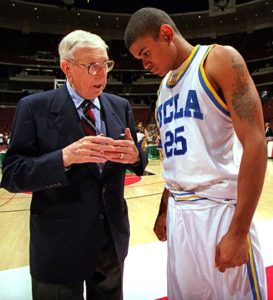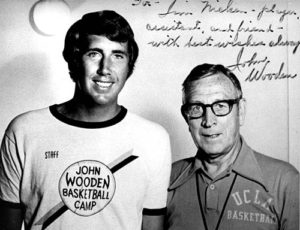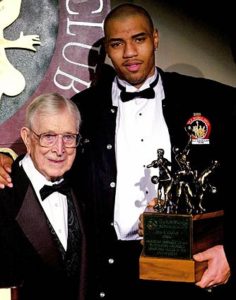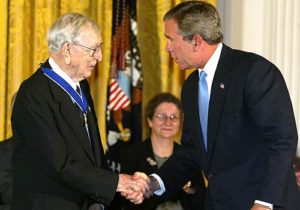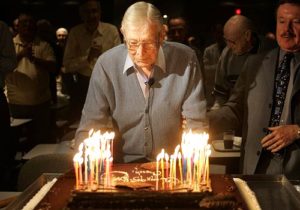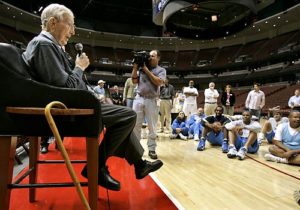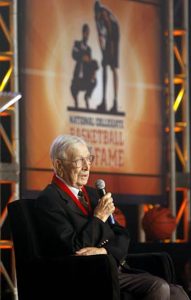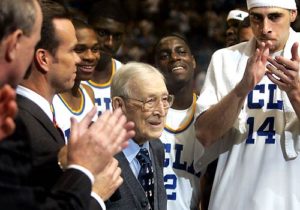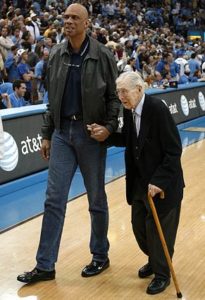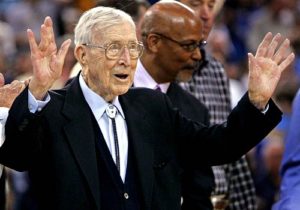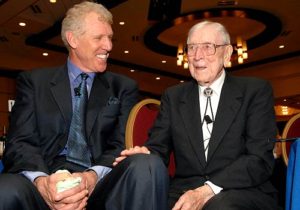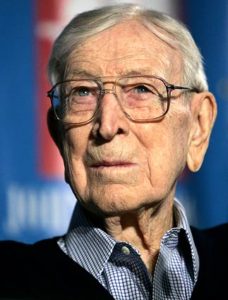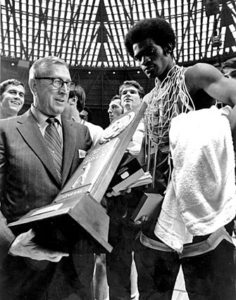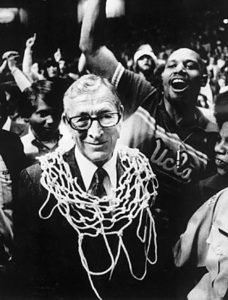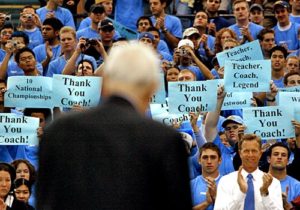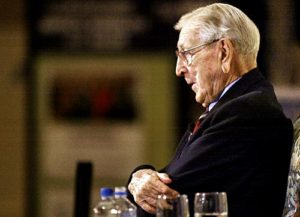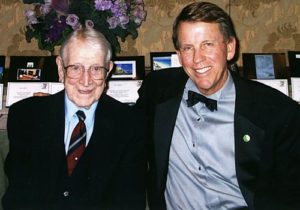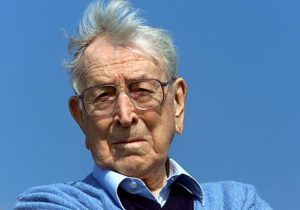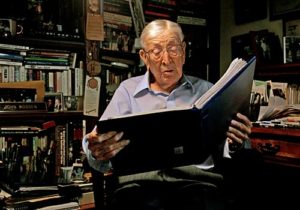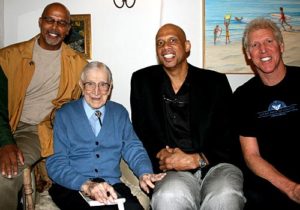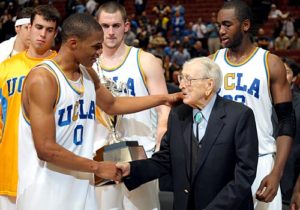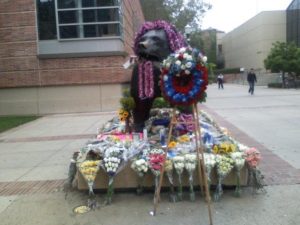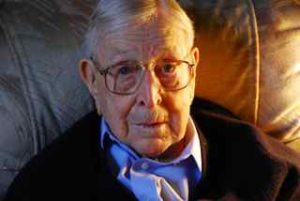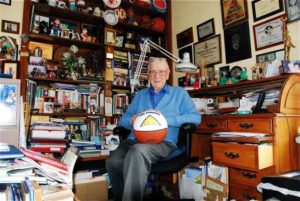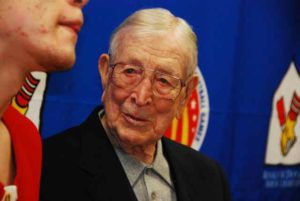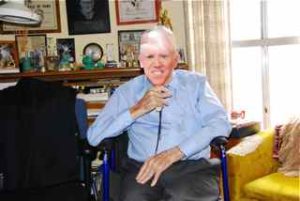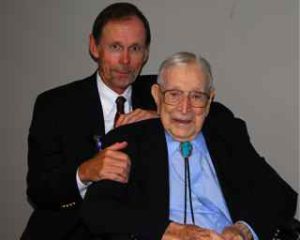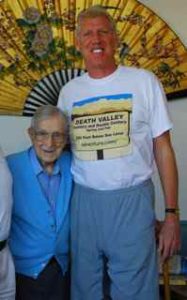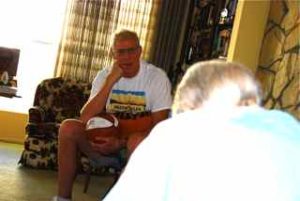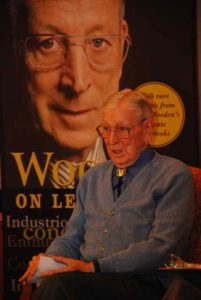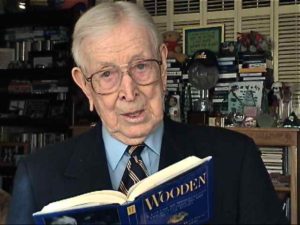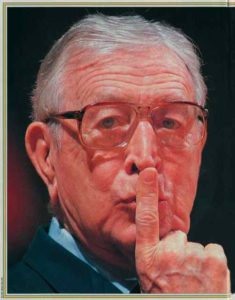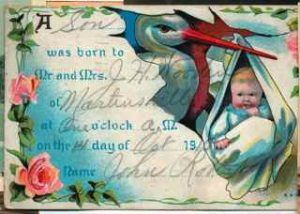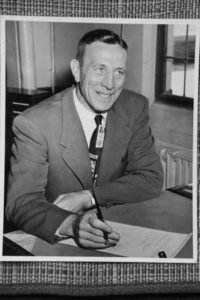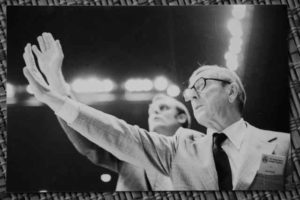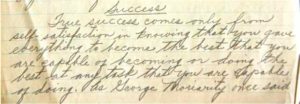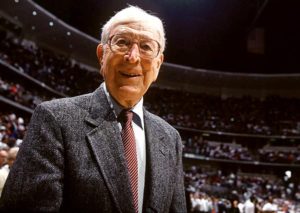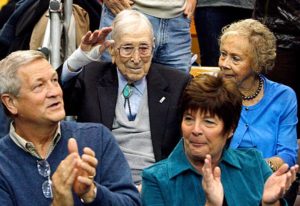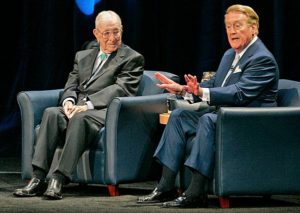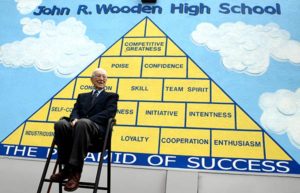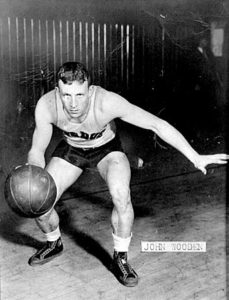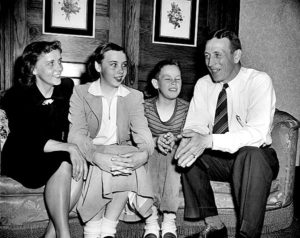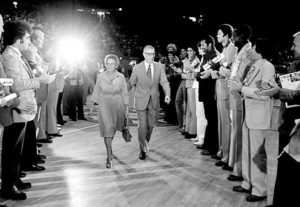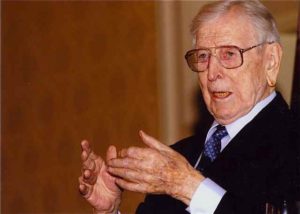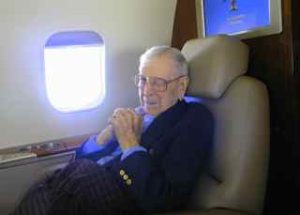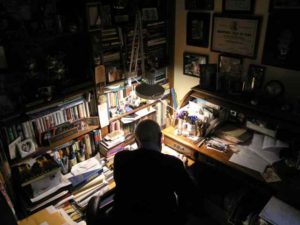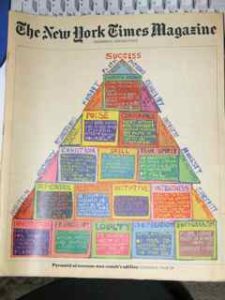John Wooden, Like UCLA, Simply the Best
 The proudest people I know are the privileged, chosen few that are lucky enough to be UCLA alums. Our memories of the glory days spent at UCLA conjure up images of a perfect world, where all the days were bright and sunny, where the playing field was completely level, the buildings and landscaping flawlessly designed and manicured and the wonders of Los Angeles at your fingertips. Those permanent features of UCLA have left indelible imprints on our lives and have helped shape our futures. But of all things UCLA, it is the people who live, learn, study, work and teach there that make the school the a unique institution. While the UCLA family has its share of incredible people in the business, legal, medical, science, engineering, music, architecture, linguistic, humanities, philosophy and psychology disciplines, the most profound influence on my relationship to UCLA has come from the athletic department.
The proudest people I know are the privileged, chosen few that are lucky enough to be UCLA alums. Our memories of the glory days spent at UCLA conjure up images of a perfect world, where all the days were bright and sunny, where the playing field was completely level, the buildings and landscaping flawlessly designed and manicured and the wonders of Los Angeles at your fingertips. Those permanent features of UCLA have left indelible imprints on our lives and have helped shape our futures. But of all things UCLA, it is the people who live, learn, study, work and teach there that make the school the a unique institution. While the UCLA family has its share of incredible people in the business, legal, medical, science, engineering, music, architecture, linguistic, humanities, philosophy and psychology disciplines, the most profound influence on my relationship to UCLA has come from the athletic department.
UCLA can easily claim an endless list of people who have changed the world. In sports, that list would include Jackie Robinson, Arthur Ashe, Kareem Abdul Jabbar, Rafer Johnson, Jimmy Connors, J.D. Morgan and Ducky Drake. But of all the legends who have given so much, it is John Wooden, the former basketball coach, who has had the greatest impact on the largest number of people. John Wooden does not have the physical prowess that enables so many others to dominate their sport. Nor does he have a dominating, overwhelming personality to give him complete control over his world. What he has is a heart, brain and soul that put him in a position to inspire others to reach levels of success and peace of mind that we could never dream of reaching by ourselves.
 Coach Wooden is a humble, private man who has selflessly given up his life to make other people’s lives better. Raised on the family farm, which his parents lost due to financial difficulties in 1925, John Wooden became one the worlds first great basketball players in the small Midwestern town of Martinsville, Indiana. After playing in three successive state high school championship games, John Wooden moved on to star both academically and athletically at Purdue, graduating with honors in 1932. When his playing days were prematurely ended due to leg injuries, John Wooden turned his life over to his pursuit of his two greatest loves: his soon to be wife, Nell, his high school sweetheart and the only girl he ever dated, and education. After various teaching positions at both the high school and collegiate levels in Indiana and a stint in the navy during world war II, John Wooden signed on to become the basketball coach at UCLA in 1948, an event that would change everything for so many of us.
Coach Wooden is a humble, private man who has selflessly given up his life to make other people’s lives better. Raised on the family farm, which his parents lost due to financial difficulties in 1925, John Wooden became one the worlds first great basketball players in the small Midwestern town of Martinsville, Indiana. After playing in three successive state high school championship games, John Wooden moved on to star both academically and athletically at Purdue, graduating with honors in 1932. When his playing days were prematurely ended due to leg injuries, John Wooden turned his life over to his pursuit of his two greatest loves: his soon to be wife, Nell, his high school sweetheart and the only girl he ever dated, and education. After various teaching positions at both the high school and collegiate levels in Indiana and a stint in the navy during world war II, John Wooden signed on to become the basketball coach at UCLA in 1948, an event that would change everything for so many of us.
John Wooden, while hired to coach basketball, never stopped at something so simple. He taught life at UCLA for 27 years before officially retiring in 1975, establishing records for success that will never be touched. All of the approximately 168 UCLA basketball lettermen John Wooden coached know that when he stopped actively running Bruin basketball, it did not signify an end to his life-long commitment to teaching. With John Wooden, there was never an end to anything. His ability to always be about what’s next, always about the future, enables him to lead an incredibly active, constructive, positive, and contributing life to this very day.
 Now 89 years young, John Wooden is still our coach in so many ways. And just as if it were 30 years ago and we were leaving Dykstra hall early in the morning on yet another of life’s journeys, he is there with us to this very day. Pushing, shaping, molding, challenging, driving us to be better. To be faster. Now, as then, this is not done in an overbearing fashion, but always in the lowest key imaginable. John Wooden teaches by example. He never asks or expects anyone to do anything that he hasn’t already done himself. He teaches by creating an environment that people want to be a part of, where we want what he has to give. While we haven’t always known this – and some of us are certainly very slow learners – learn we eventually did.
Now 89 years young, John Wooden is still our coach in so many ways. And just as if it were 30 years ago and we were leaving Dykstra hall early in the morning on yet another of life’s journeys, he is there with us to this very day. Pushing, shaping, molding, challenging, driving us to be better. To be faster. Now, as then, this is not done in an overbearing fashion, but always in the lowest key imaginable. John Wooden teaches by example. He never asks or expects anyone to do anything that he hasn’t already done himself. He teaches by creating an environment that people want to be a part of, where we want what he has to give. While we haven’t always known this – and some of us are certainly very slow learners – learn we eventually did.
That is what John Wooden teaches, the ability to learn how to learn. The same thing that he promised us as high school recruits 32 years ago. While all the other schools chasing us promised basketball, material and individual success, John Wooden talked about the chance of coming to UCLA and being part of something special. The opportunity to train your mind, to learn how to think, to develop skills, to make decisions, to dream, to achieve peak performance. And by the way, if you lived up to your responsibilities as a student and a human being, then you earned the privilege of becoming a member of the UCLA basketball team.
And teach he did, everything as a matter of fact, on a constant basis. From showing us how to put our shoes and socks on, to how to get dressed properly so that our equipment and tools would never interfere with our goals and dreams. to how to build a foundation based on the human values and personal characteristics that are embodied in his pyramid of success so that when you aren’t hot, when you are not in the zone, when the ball bounces the other way, you will still be able to achieve peak performance on command. And all the while he is teaching, there are the underlying themes, his principles, his foundation, his core as a human being, his pyramid. Particularly his belief that basketball, like life, is not a game of size and strength but a game of skill, timing and position. And that it’s not how tall you are, but how tall you play. It’s not how high you jump, but where you are and when you jump.
 John Wooden gave us the necessary tools to overcome the adversity and obstacles that he knew from the beginning would always be in our way. He taught us how to practice against an imaginary, ideal opponent so as not to waste time and effort. He taught us to find a source of motivation to inspire us to ever higher levels of preparation and work. He taught us how to be in balance so we could quickly get to what’s next, and that quickness is a mental skill based on anticipation, not a physical skill based on athleticism. He taught us that confidence is an integral part of achieving peak performance, but that confidence must come from a lifetime of preparation that ensures deliverance to the championship level.
John Wooden gave us the necessary tools to overcome the adversity and obstacles that he knew from the beginning would always be in our way. He taught us how to practice against an imaginary, ideal opponent so as not to waste time and effort. He taught us to find a source of motivation to inspire us to ever higher levels of preparation and work. He taught us how to be in balance so we could quickly get to what’s next, and that quickness is a mental skill based on anticipation, not a physical skill based on athleticism. He taught us that confidence is an integral part of achieving peak performance, but that confidence must come from a lifetime of preparation that ensures deliverance to the championship level.
All of this was done in the subtlest of ways. While our practices were the most demanding endeavors that I’ve ever been a part of, so physically, emotionally, mentally and psychologically taxing, there is always the sense of joy, of celebration and of people having fun playing a simple game. Always positive, always constructive, John Wooden drives us in ways and directions that we are not aware of, always with the goal of making us better. It is never about him, never about the struggle for material accumulation, but always about individual skill and personal development within the framework of the team, the game and UCLA. Our practices, our lives are constantly structured around the four laws of learning: explanation, demonstration, correction and repetition. And repeat we do. Everything, everyday until we have become John Wooden ourselves. But that is not his goal, for he knows that the strength of the team is the strength of the individual. And that when everyone thinks alike, no one is thinking. That is what and how he teaches. Rarely telling us the what or why, but rather showing us how and letting us come to the rest of the answer on our own. He never talks about winning and losing but rather about the effort to win. He rarely talks about basketball but generally about life. He never talks about strategy, statistics or plays but rather about people and character. And he never tires of telling us that once you become a good person, then you have a chance of becoming a good basketball player or whatever else you may want to do.
Of course we didn’t understand or realize any of this while we were living it. We thought he was nuts, crazy. And why not. We won all of our games during our first three and a half years at UCLA. It wasn’t until we started to lose at the end of our senior year, it wasn’t until we left UCLA and ran into the adversity that he told us would be there, that it started to dawn on me just how special we had it at UCLA. It has been 26 years now since I graduated from UCLA. I have spent those years trying to duplicate that period in my life. Our house, in my hometown of San Diego, is a shrine to UCLA and John Wooden, with memorabilia, the pyramid and pictures of John Wooden everywhere. I’ve taken my kids to his house, the same house that he has lived in since 1973. The house the Nell put together, the house that has not changed since Nell passed away in 1984. I’ve taken my kids there to get the lessons of life, including how to put your shoes and socks on. Like me 30 years ago, my kids who are now 24, 22, 20 and 18 and who have lived this story of John Wooden and UCLA their whole lives, think I’m nuts. John Wooden to this day regularly reminds me what a slow learner I am. But I am closer to John Wooden today than I’ve ever been.
 We are friends now. John Wooden was not your friend when you played for him at UCLA. He wouldn’t have it that way. He knew he had to ask us to do things that were not always in our best self interest. He knew that he had to take us to places we didn’t want to go. But now it’s different. So many of the battles have been fought and won. Now we are friends. I call him on the phone constantly and go to see him as often as possible, always insisting that we sit in his office, his den, his sanctuary. The den is a museum of the history of basketball and life, arranged by Nell and unchanged over the years. It’s an incredible place, so inspiring, so bright, so positive, so John Wooden. I always sit at the same end, right next to his desk, so I can get as close as physically possible to this remarkable spirit. But also to sit as far as possible from the framed correspondence between John Wooden and Richard Nixon that hangs on the east wall. Its not a stretch to say that my own personal correspondence with Nixon was quite a bit different than John Wooden’s.
We are friends now. John Wooden was not your friend when you played for him at UCLA. He wouldn’t have it that way. He knew he had to ask us to do things that were not always in our best self interest. He knew that he had to take us to places we didn’t want to go. But now it’s different. So many of the battles have been fought and won. Now we are friends. I call him on the phone constantly and go to see him as often as possible, always insisting that we sit in his office, his den, his sanctuary. The den is a museum of the history of basketball and life, arranged by Nell and unchanged over the years. It’s an incredible place, so inspiring, so bright, so positive, so John Wooden. I always sit at the same end, right next to his desk, so I can get as close as physically possible to this remarkable spirit. But also to sit as far as possible from the framed correspondence between John Wooden and Richard Nixon that hangs on the east wall. Its not a stretch to say that my own personal correspondence with Nixon was quite a bit different than John Wooden’s.
At 89, John Wooden is happier, more positive, more upbeat than ever. There is not a bit of cynicism, not an ounce of bitterness, absolutely no jealousy or envy. He is still the same teacher, the same positive force, the person who we would all like to become, only better. Better because he has won life’s greatest battles. Better because John Wooden represents the conquest of substance over hype, the triumph of achievement over erratic flailing, the conquest of discipline over gambling and the triumph of executing an organized plan over hoping that you’ll be lucky, hot or in the zone. John Wooden also represents the conquest of sacrifice, hard work and commitment to achievement over the pipe dream that some one will just give you something or that you can take a pill or turn a key to get what you want.
The joy and happiness in John Wooden’s life comes today, as it always has, from the success of others. He regularly tells us that what he learned from his two favorite teachers, Abraham Lincoln and Mother Theresa, is that a life not lived for others is not a life.
It’s usually sad to say goodbye to those you love when it’s time to go. Not so with John Wooden. With him, it’s always about the next time, the next event, the next game. John Wooden still has the enthusiasm, energy, industriousness, initiative and love of life that allows him to get up every day, quite early I must add, even though the legs are now failing him, with the attitude of “we get to play basketball today. Lets go.”
I thank John Wooden every day for all his selfless gifts, his lessons, his time, his vision and especially his patience.
This is why we call him coach.
Sincerely, 
